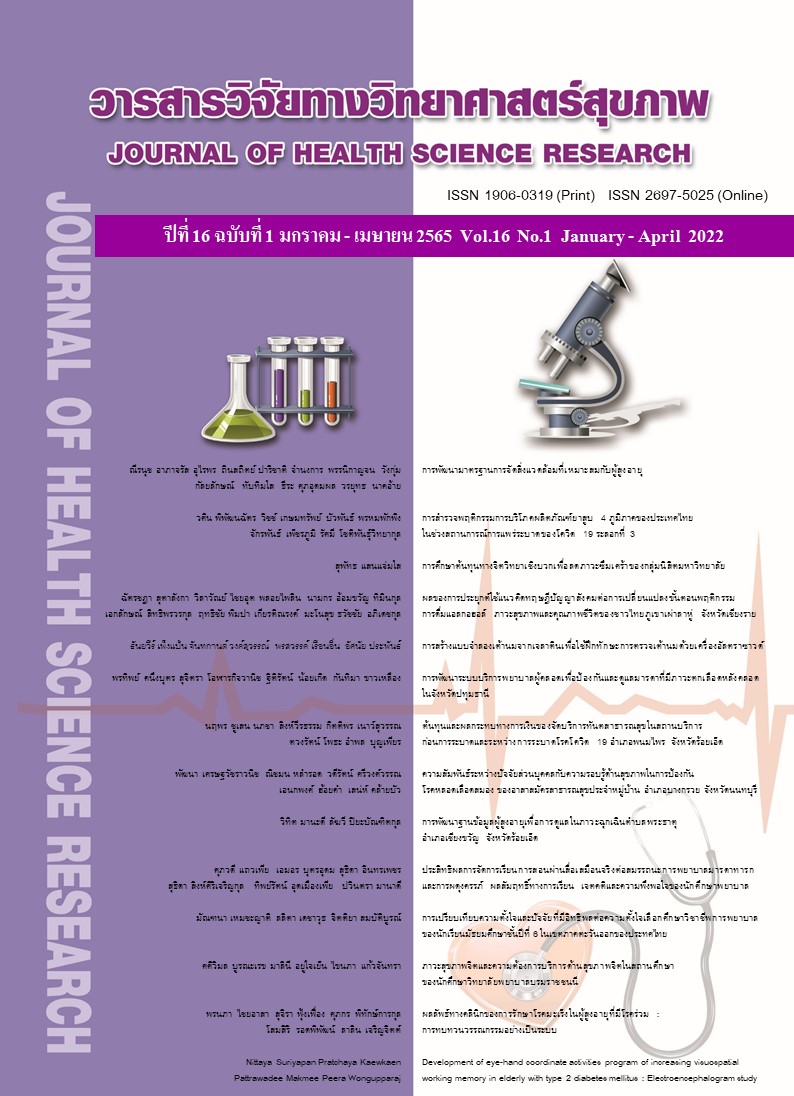การศึกษาต้นทุนทางจิตวิทยาเชิงบวกเพื่อลดภาวะซึมเศร้า ของกลุ่มนิสิตมหาวิทยาลัย
Main Article Content
บทคัดย่อ
บทนำ : ต้นทุนทางจิตวิทยาเชิงบวกนับเป็นแนวทางหนึ่งในการป้องกันและดูแลบุคคลที่อยู่ในสภาวะซึมเศร้าเป็นเสมือนการสร้างภูมิคุ้มกันทางจิตใจให้พร้อมสำหรับการรับมือต่อสถานการณ์ที่อาจเกิดขึ้น โดยเฉพาะในกลุ่มนิสิตที่ควรเสริมสร้างให้เกิดความเข้มแข็งทางจิตใจ เพื่อสามารถใช้ชีวิตในมหาวิทยาลัยอย่างมีคุณภาพ
วัตถุประสงค์การวิจัย : เพื่อค้นหาต้นทุนทางจิตวิทยาเชิงบวกที่บรรเทาหรือลดภาวะซึมเศร้าในกลุ่มนิสิตมหาวิทยาลัย
วิธีการวิจัย : การศึกษาวิจัยเชิงคุณภาพ ผ่านการสัมภาษณ์เชิงลึกกับผู้ให้ข้อมูล จำนวนทั้งหมด 15 คน วิเคราะห์แก่นสาระของเรื่องราวด้วยกรอบแนวคิดทฤษฎีทางจิตวิทยาเชิงบวก และ ทฤษฎีปฏิสัมพันธ์เชิงสัญลักษณ์ และมุมมองของผู้วิจัยเพื่อวิเคราะห์ประสบการณ์เฉพาะของบุคคล และกำหนดสาระสำคัญ
ผลการวิจัย : ต้นทุนทางจิตวิทยาเชิงบวกสำคัญที่ช่วยลดภาวะซึมเศร้า สามารถแบ่งได้เป็น 1) ปัจจัยภายในตนเอง ประกอบด้วย ทักษะการจัดการกับปัญหา การมีเป้าหมาย การมองโลกในแง่ดี การมีความหวัง ความเอื้อเฟื้อ และการมองเห็นคุณค่าในตนเอง 2) ปัจจัยจากแรงสนับสนุนทางสังคม ส่วนสาเหตุสำคัญที่นำมาสู่ภาวะซึมเศร้า ได้แก่ ครอบครัวหรือบุคคลใกล้ชิด สภาพสังคมและเศรษฐกิจ และลักษณะภายในบุคคลที่ขาดความสามารถในการรับมือกับปัญหา
สรุปผล : ต้นทุนทางจิตวิทยาเชิงบวกมีส่วนช่วยในการป้องกัน ลดภาวะซึมเศร้า ดังนั้นการพัฒนาจิตใจให้เข้มแข็งจึงเป็นแนวทางหนึ่งในการช่วยดูแลบุคคลที่อยู่ในสภาวะซึมเศร้า
Downloads
Article Details

อนุญาตภายใต้เงื่อนไข Creative Commons Attribution-NonCommercial-NoDerivatives 4.0 International License.
บทความที่ได้รับการตีพิมพ์เป็นลิขสิทธิ์ของวิทยาลัยพยาบาลบรมราชชนนี จังหวัดนนทบุรี
ข้อความที่ปรากฏในบทความแต่ละเรื่องในวารสารวิชาการเล่มนี้เป็นความคิดเห็นส่วนตัวของผู้เขียนแต่ละท่านไม่เกี่ยวข้องกับวิทยาลัยพยาบาลบรมราชชนนี จังหวัดนนทบุรี และคณาจารย์ท่านอื่น ในวิทยาลัยฯ แต่อย่างใด ความรับผิดชอบองค์ประกอบทั้งหมดของบทความแต่ละเรื่องเป็นของผู้เขียนแต่ละท่าน หากมีความผิดพลาดใด ๆ ผู้เขียนแต่ละท่านจะรับผิดชอบบทความของตนเองแต่ผู้เดียว
เอกสารอ้างอิง
Lotrakul M, Sukanit P. Ramathibodi’s essential of psychiatry. 4th ed. Bangkok: Department of Psychialtry, Faculty of medicine Ramathibodi Hospital, Mahidol University; 2015. (in Thai).
Auerbach RP, Alonso J, Axinn WG, Cuijpers P, Ebert DD, Green JG, et al. Mental disorders among college students in the World Health Organization world mental health surveys. Psychol Med. 2016;46(14):2955-70. doi: 10.1017/S003 3291716001665.
Limsricharoen K, Handee N, Chulakdabba S. Prevalence and associated factors of depression in second to sixth years medical students, Faculty of Medicine in Thailand. Journal of the Psychiatric Association of Thailand. 2014;59(1):29-40. (in Thai).
Samarksavee N, Sangon S. Factors associated with depression in nursing students. The Journal of Psychiatric Nursing and Mental Health. 2015;29(3):11-27. (in Thai).
Rukkhajeekul S. Depression and suicidal behaviors among Naresuan university students. Journal of the Psychiatric Association of Thailand. 2013;58(4):359-70. (in Thai).
Ebert DD, Buntrock C, Mortier P, et al. Prediction of major depressive disorder onset in college students. Depress Anxiety. 2019;36(4):294–304. doi: 10.1002/da.22867.
Suleiman AK, Ismadi NFI, Choudhry FR, Munawar K, Hameed MA. Determinant factors of depression: A survey among university students. Malaysian J. Public Health Med. 2017;17(3):97-103. doi: 10.37 268/mjphm/vol.17/no.3/art.222.
Villatte A, Marcotte D, Potvin A. Correlates of depression in first-year college students. Can. J. High. Educ. 2017;47(1):114-36. doi: 10.47678/cjhe.v47i1.1864 29.
Child and Adolescent Mental Health Rajanagarindra Institute. A practical manual for the care of adolescents with depression,
for public health personnel and education personnel: Clinical practice guideline for adolescents with depression. Bangkok: Beyond publishing; 2018. (in Thai).
Lopez SJ, Pedrotti JT, Snyder CR. Positive psychology: The scientific and practical exploration of human strengths. 3rd ed. Thousand Oaks : Sage Publication; 2014.
Kwok S, Gu M, Kit KTK. Positive psychology intervention to alleviate child depression and increase life satisfaction: A randomized clinical trial. Res Soc Work Pract. 2016;26(4):350-61. doi: 10.1177/1049731516629799.
Santos V, Paes F, Pereira, V, Arias-Carrión O, Silva AC, Carta MG, et al. The role of positive emotion and contributions of positive psychology in depression treatment: systematic review. Clin Pract Epidemiol Ment Health. 2013;9:221-37. doi: 10.2174/1745017901309010221.
Ho HCY, Yeung DY, Kwok S. Development and evaluation of the positive psychology intervention for older adults. J. Posit. Psychol. 2014;9(3):187-97. doi: 10.1080/17439760.2014.888577.
Alsubaie MM, Stain HJ, Webster LAD, Wadman R. The role of sources of social support on depression and quality of life for university students. Int J Adolesc Youth. 2019;24(4):484-96. doi: 10.1080/02673843.2019.1568887.
Siriporn J. Qualitiative research in health science. 3rd ed. Bangkok: Witthayaphat; 2015. (in Thai).
Morrow SL. Qualitative research in counseling psychology: conceptual foundations. J Couns Psychol. 2007;35(2):209-35. doi: 10.1177/0011000006286990.
McCue M, Parikh SV, Mucha L, et al. Adapting the goal attainment approach for major depressive disorder. Neurol Ther. 2019;8(2): 167–76. doi: 10.1007/s40120-019-00151-w.
Uribe FAR, de Oliveira SB, Junior AG, da Silva Pedroso J. Association between the dispositional optimism and depression in young people: a systematic review and meta-analysis. Psicol Refl. Crit. 2021 Nov 29;34(1):37. doi: 10.1186/s41155-021-00202-y.
Anzaldi K, Shifren K. Optimism, pessimism, coping, and depression: A study on individuals with Parkinson’s disease. Int J Aging Hum Dev. 2019;88(3):231-49. doi: 10.1177/0091415018763401.
Hedayati M, Khazaei M. An investigation of the relationship between depression, meaning in life and adult hope. Procedia soc Behav Sci. 2014;114: 598-601. doi: 10. 1080/17439760.2014.88577.
Querido AIF, Laranjeira CA, Dixe MDACR. Hope in a depression therapeutic group: A qualitative case study. Rev Bras Enferm. 2021;74(4):1-8. doi: 10.1590/00 34-7167-2020-1309.
Feng Y, Zong M, Yang Z, Gu W, Dong D, Qiao Z. When altruists cannot help: the influence of altruism on the mental health of university students during the COVID-19 pandemic. Glob health. 2020;16(1):61. doi: 10.1186/s12992-020-00587-y.
Minev M. Self-esteem and depression in adolescents. Trakia J Sci. 2018;16(2):119-27. doi: 10.15547/tjs.2018.02.008.
McWhirter P, Nelson J, Waldo M. Positive psychology and curative community groups: Life satisfaction, depression, and group therapeutic factors. J Spec Group Work. 2014;39(4):366-80. doi: 10.1080/01933922.2014.955384.
Wang X, Cai L, Qian J, Peng J. Social support moderates stress effects on depression. Int J Ment Health Syst. 2014;8(1):41. doi: 10.1186/1752-4458-8-41.


